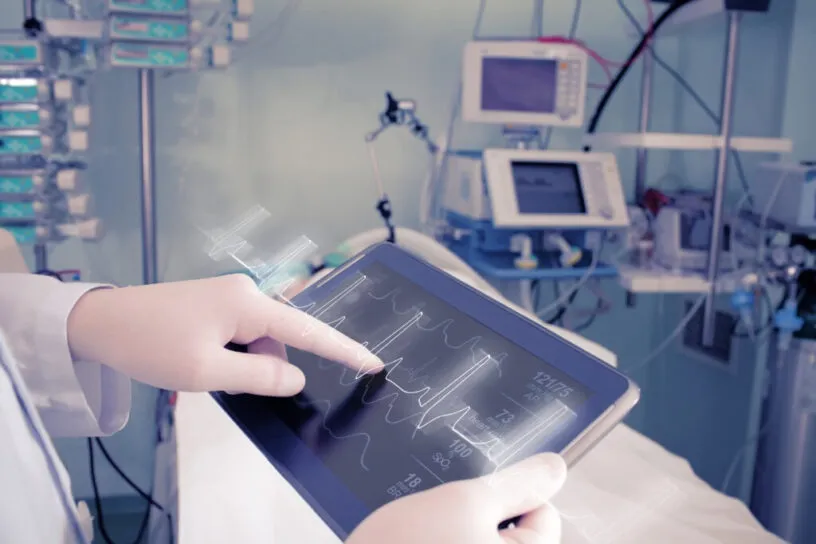Innovation, Collaboration, and Success: A Q&A on the Future of Innovation in MedTech

This blog features insights from Caroline Irungu, Managing Partner, Medical Device & Diagnostics, and Carl Kennedy, Managing Partner, Medical Device Commercial Strategy at Medidata.
What’s the Significance of the Clinical Trial Innovation Award that Medidata Has Recently Won?
Carl: Winning this award underscores our value in thinking about the entire life sciences ecosystem. It validates that the solutions we're driving are fundamentally necessary and are truly redefining how healthcare providers, patients, and systems interact with and benefit from technology.
Caroline: This award is a testament to our entire team's hard work and dedication. Being recognized among such a broad, competitive field of innovators highlights our commitment to excellence and inspires us to continue pushing the boundaries of what’s possible in MedTech and life sciences overall.
What Are the Key Challenges for Medtech Clinical Trials?
Caroline: Adapting to the rapid pace of technological advancements while maintaining regulatory compliance with increasingly stringent standards for clinical evidence presents a significant challenge in MedTech. Bringing breakthrough MedTech products to market is expensive. Managing these dynamics effectively requires a deep understanding of technology’s evolution and the industry environment. MedTech companies are evolving from running clinical trials on paper to more digital approaches that can support faster study execution, easier health data integration, and more patient engagement.
Carl: The amount of data points generated in MedTech implants and devices can be overwhelming. There is a need for technology partners who can unify disparate data sources to improve patient care. With our extensive history—of over 25 years and 33,000+ clinical trials involving more than 10 million patients—we’ve developed a nuanced approach that addresses these challenges and sets new benchmarks for speed and efficiency in clinical trials. Time to money is critical—both top-line revenue growth and profitability—and MedTech customers rely on us to help them execute faster and more reliably.
How Are We Enabling Better Transparency Across the Patient Care Pathway?
Carl: Our strategy centers on an integrative data-to-insights approach where transparency isn’t a buzzword but a practical reality. By aligning data from multiple sources, we create a robust framework for ongoing evaluation, adjustments, adaptation, and real-time improvement of device performance across different healthcare settings.
Caroline: It’s critical to improving patient care that we continuously refine our strategies, monitor device performance, and anticipate potential issues before they become critical.
“The insights we obtain from conscientiously allowing for transparency across the care pathway ensures that the devices we help bring to market are safe, effective, and aligned with the needs of patients and healthcare providers—for the long term.”
What Are the Critical Ingredients of Medtech Innovation?
Caroline: Innovation in MedTech is about embracing technologies, including automation using AI and machine learning, to improve and simplify certain aspects of care delivery and clinical trials. These tools empower us to decipher complex datasets and extract meaningful patterns that can guide clinical decisions. MedTech companies are generating so much data; think of the most novel implants—they require CT, MRI, ultrasounds, and other modalities. Medidata leverages over 20,000 hospital connections to unify these disparate data and identify patients who meet specific criteria. Imagine the impact of this on speeding up patient identification, study enrollment, and patient outcomes.
Carl: It’s also about how these technologies integrate within healthcare frameworks to bolster functionality and user experience. For instance, marrying data from electronic medical and health records into a seamless ecosystem improves our ability to act on this intelligence swiftly and effectively, maximizing patient outcomes. Innovation is not just about creating new tools but also making sure they enhance the workflows they’re designed to support.
Why Is Health and Medical Data Integration, Including Electronic Health Record (EHR) Integration, So Important for Medtech Companies?
“Seamless health record integration is essential to creating cohesive healthcare experiences. It ensures that patient data is accurate, up-to-date, and accessible across different care settings.”
Carl: Our tools, Rave Companion and Medidata Link, are pivotal in reliably achieving these integrations by simplifying the connectivity between disparate systems.
Caroline: It’s about bringing the proper treatment to the right patient at the right time—and minimizing the mental gymnastics patients must do to find the right therapy. It’s also about enabling clinical research as a therapy option. Good health record integration leads to better clinical decisions, efficient trial setups, and more streamlined processes overall, helping prevent data loss, reduce errors, accelerate research, and improve patient outcomes. This reduces the administrative burden on healthcare providers, ultimately enriching the site and patient experience.
Why Does Data Linkage in Clinical Trials and the Ability to Use Real-world Data Present Such an Enormous Opportunity?
Carl: The power of data linkage through platforms like Medidata Link cannot be understated. By forging a relationship between clinical trial data and real-world data, we can expand our understanding of device performance over time, letting us track their long-term effectiveness and safety—crucial for regulatory compliance—and to meet the evolving needs of patients and clinicians. Medical device manufacturers and diagnostics (MD&D) companies are facing mounting pressure for better, more holistic evidence from regulators, payers, and providers.

Caroline: And it's transformative for MedTech companies and patients. By linking clinical trials to patients’ real-world data, medical device companies can provide more robust and real-time evidence to meet the stringent requirements of the evolving regulatory landscape, and ultimately enhance patient safety and optimize outcomes by informing label expansion indicators for broader, more diverse patient populations.
Learn how we can partner to achieve clinical, regulatory, and long-term success.
Enjoyed this article? Click here to share it with your network.
Contact Us

